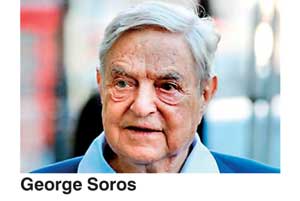Monday Feb 23, 2026
Monday Feb 23, 2026
Wednesday, 22 June 2016 00:00 - - {{hitsCtrl.values.hits}}
LONDON (Reuters): George Soros, the billionaire who earned fame by betting against the pound in 1992, said that a British vote on Thursday to leave the European Union would trigger a bigger and more disruptive sterling devaluation than the fall on Black Wednesday.
Soros used Quantum Fund in 1992 to bet successfully that sterling was overvalued against the Deutsche Mark, forcing then-Prime Minister John Major to pull the pound out of the European Exchange Rate Mechanism (ERM).
Soros, in an opinion piece in the Guardian newspaper, said that in the event of a British exit, or Brexit, the pound would fall by at least 15 percent, and possibly more than 20%, to below $1.15 from its current level of around $1.46.
“The value of the pound would decline precipitously. It would also have an immediate and dramatic impact on financial markets, investment, prices and jobs,” Soros, who is 85, said in the Guardian.
“I would expect this devaluation to be bigger and also more disruptive than the 15 percent devaluation that occurred in September 1992, when I was fortunate enough to make a substantial profit for my hedge fund investors.”
Soros, ranked as the world’s 23rd richest person by Forbes magazine with a fortune of $24.9 billion, said the Bank of England would not cut rates after a British exit and that there would be few monetary policy tools left to ease a recession or a fall in British house prices.
He also pointed to the “very large” current account deficit in the United Kingdom and said a post-Brexit devaluation would be unlikely to improve manufacturing as trading conditions would be too uncertain to undertake new investments or hire workers.
Hungarian-born Soros said the scale of the sterling devaluation would compare with 1967, when then-Prime Minister Harold Wilson devalued the pound to $2.40 from $2.80.
Speculators, Soros said, would be eager to exploit a Brexit situation to profit.
“Today, there are speculative forces in the markets much bigger and more powerful. And they will be eager to exploit any miscalculations by the British government or British voters,” Soros said.
“Brexit would make some people very rich - but most voters considerably poorer,” Soros said.
Members of Britain’s Leave campaign say some bankers, big companies and politicians are trying to scare British voters with overblown warnings about the financial and economic impact of a Brexit.
Opponents of EU membership say Britain could prosper if it cut itself free from what they portray as a doomed German-dominated project in excessive debt-funded welfare spending.
The world’s biggest banks including Citi and Goldman Sachs will draft in senior traders to work through the night following Britain’s referendum on EU membership, set to be among the most volatile 24 hours for markets in a quarter of a century.
A vote to leave the European Union on June 23 would spook investors by undermining post-World War Two attempts at European integration and placing a question mark over the future of the United Kingdom and its $2.9 trillion economy.
Citi, Deutsche Bank, JPMorgan, Goldman Sachs, HSBC, Barclays, Royal Bank of Scotland and Lloyds are among those banks planning to have senior staff and traders working or on call in London as results start to dribble in after polls close at 2100 GMT, according to sources.
“British voters are now grossly underestimating the true costs of Brex it,” Soros said. “Too many believe that a vote to leave the EU will have no effect on their personal financial position. This is wishful thinking.”